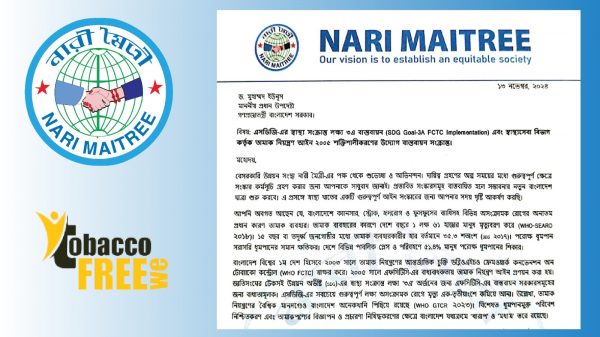


Special Representative
To protect the young generation from the deadly grip of tobacco, anti-tobacco youth leaders and mothers’ forums Against tobacco have called for the speedy passage of proposed amendments to the Tobacco Control Act. On Wednesday, November 14, on behalf of 2,000 young students and 21 members of the Mothers’ Forum Against tobacco, Nari Maitree a Non governmental organization submitted an open letter with these demands to the Chief Adviser’s office, Ministry of Health, Ministry of Finance, and Ministry of Law.
The open letter outlined six proposed amendments. To align the current Tobacco Control Act with the WHO Framework Convention on Tobacco Control (FCTC), key proposals included in the Ministry of Health’s draft include: banning designated smoking areas in all public spaces and transportation, prohibiting the display of tobacco products at sales points, fully banning any Corporate Social Responsibility (CSR) activities by tobacco companies, increasing the size of pictorial health warnings on tobacco packaging from 50% to 90%, prohibiting the sale of individual sticks, unpackaged, and loose smokeless tobacco products, and fully banning all emerging tobacco products, including e-cigarettes. If these amendments are promptly passed, it is projected that 161,000 lives per year, or 442 lives per day, could be saved.
Additionally, the groups urged people to resist the various misinformation campaigns by cigarette companies. Tobacco companies often promote the idea that passing these amendments will reduce tax revenue. However, data from the National Board of Revenue (NBR) does not support this claim. When the Tobacco Control Act was first passed in 2005, revenue from tobacco was 2,888 crore taka. In the following fiscal year, 2005-06, revenue increased to 3,351 crore taka. When the law was amended in 2013, revenue from tobacco was 10,170 crore taka, which rose to 12,556 crore in the 2013-14 fiscal year. In the 2022-23 fiscal year, revenue from the tobacco sector totaled 32,823 crore taka. Thus, over the 18 years since the passage of the Tobacco Control Act in 2005 and its strengthening through the 2013 amendments, revenue from tobacco has increased nearly 12.5 times. Additionally, from 2009 to 2017, tobacco use in Bangladesh declined by nearly 18%. Strengthening the Tobacco Control Act would thus protect public health, increase revenue, and reduce tobacco use.
Meanwhile, two major tobacco companies, BAT and JTI, employ fewer than 2,000 workers in total. However, they are spreading false claims that many thousands of workers will lose their jobs if the amendments are passed. The time to stand against this misinformation is now. For this reason, the groups are calling for the swift passage of the proposed amendments to the Tobacco Control Act through the open letter.
It is noteworthy that Bangladesh was one of the first countries in the world to sign the WHO Framework Convention on Tobacco Control (FCTC) in 2003. In 2005, in compliance with the FCTC, Bangladesh enacted the Tobacco Control Act. To achieve Sustainable Development Goal (SDG) 3a, related to health, implementation of the FCTC is mandatory for all governments. The most critical SDG target is to reduce deaths from non-communicable diseases by one-third. However, according to the WHO Global Tobacco Control Report (GTCR) 2023, Bangladesh is still lagging in global tobacco control standards, especially in creating smoke-free environments and banning tobacco product advertising and promotion, where Bangladesh ranks “poor” and “moderate” respectively.